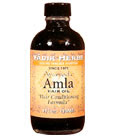Ayurveda Hair care
 Here is a list of Ayurvedic products and their suggested use of the products listed.
Here is a list of Ayurvedic products and their suggested use of the products listed.Bhringraj is an ancient remedy for hair loss, premature graying, skin allergies, and devitalized skin and hair. (Use Bhringraj powder in combination with amla, shikakai, and neem powders for an herbal hair rinse, or make a coconut oil infusion with these herbs to use as a conditioning oil treatment. Bhringraj powder can also be added to Ayurvedic soaps, facials, body wraps, and washbags).
Amla fruit, also known as the Indian gooseberry, comes from a small tree that grows throughout India. The tree is worshipped as “Mother Nature” due to its nourishing fruit. The fruit is one of the highest natural sources of vitamin C, and it yields an oil that has been used for centuries in Ayurvedic medicine to treat the hair and scalp. It is said to penetrate the scalp and strengthen hair at its root, to stop and reverse abnormal hair loss and to promote stronger, healthier new growth. It is also an excellent conditioning herb.
(To use Amla powder, make a hot water infusion with the powder and strain it. The tea can be used to rinse the hair after shampooing. Amla is best used in combination with shikakai, aritha, neem, bhringraj and tulsi powders. When using the herbs in combination, steep all of the herbs in water and strain the tea. The tea should be kept refrigerated and used within 4 days or preserved with an anti-bacterial preservative).
(Alternatively, you can make an oil infusion by warming sesame or olive oil in a double boiler with the herbs for 4 hours. After 2 hours has passed, replace the spent herbs. After 4 hours, strain the infusion and preserve it with rosemary oil extract or T-50 (A type of Vitamin E oil).
Shikakai powder comes from de-shelled shikakai nuts. Shikakai is referred to as "fruit for the hair." It has a naturally mild pH, and it gently cleans the hair without stripping it of natural oils.
( Use shikakai as a natural hair wash for sensitive scalps or to control dandruff. Shikakai is said to promote hair growth and strengthen hair roots.For best results, combine 1 tablespoon each of shikakai powder, amla powder, bhringraj and aritha powder. Add them to 1 cup boiling water. Allow the infusion to sit for 10 minutes. If you have dandruff or scalp problems, you can add 1 teaspoon of neem powder to this mixture. You can also add 1 teaspoon of liquid castille soap to the mixture if you have very oily hair. Once cooled, use this mixture to wash your hair. Rinse well with warm water. If desired, follow with a light spritzing of amla and brahmi oils to condition the hair.)
Tulsi is a strong natural antiseptic and germicidal used in Ayurvedic medicine to treat various infections and illnesses.
(Use tulsi powder in facials or in a bath to fight acne, eczema, psoriasis, and other skin conditions. Tulsi powder is also useful for dandruff and general hair care.)
Haritaki is said to have strong anti-bacterial properties. It is revitalizing, toning, nourishing and astringent when used in skin and hair care formulations. (Add haritaki powder to facial scrubs, masks, body wraps, hair wraps and hair rinses. Add it to soaps with neem oil for an Ayurvedic germ fighting formula. You can also make a tea infusion by steeping haritaki powder in boiling water. The tea can be strained and used in place of water in skin care formulations).
Hibiscus petals, also known as Jaswand, were used in Ayurvedic medicine to stimulate thicker hair growth and to prevent premature graying, hair loss and scalp disorders. The petals act as a natural, emollient hair conditioner. Hibiscus petal powder can be used in Ayurvedic hair washes, oil infusion treatments and vinegar rinses for the hair. (Use hibiscus petal powder in combination with brahmi and amla powders).
Neem powder is highly anti-bacterial, and the leaves have been used for centuries to make anti-bacterial washes and poultices. Add neem powder to cosmetic clays to make a face pack or body wrap that is suitable for acne prone skin. Add neem powder to salt scrubs for skin problems such as eczema and psoriasis. Make a tea infusion with neem powder, and use the infusion in a bath to treat chicken pox or oozing skin eruptions. (Use it in a gardener’s hand scrub with corn meal to provide anti-bacterial cleansing after working in the soil. Neem powder works well as a hair oil treatment for scalp conditions).
Aritha powder, also known as Soapnut, comes from the fruit of the Soapnut tree. The pulp of the fruit contains a high level of saponins that act as natural foaming agents. This powder can be used to wash delicate fabrics as well as to wash sensitive skin and hair. Add the powder to a facial mix of milk powder and clay to provide delicate cleansing of the skin. Add aritha powder to salt scrubs to add cleansing action.
(As a hair and body wash, aritha powder is best used in a tea. Add 1 tablespoon of aritha powder to a cup of boiling water. Allow it to sit for 10 minutes. Cool and strain the tea for use as a hair wash or mild cleanser. Aritha can also be combined with amla, neem & shikakai powders for a more nutritive hair wash. Steep all of the herbs in water, and strain the tea. The tea should be kept refrigerated and used within 4 days or preserved with an anti-bacterial preservative.
Use with caution around the eyes).
From- http://www.fromnaturewithlove.com/


Comments